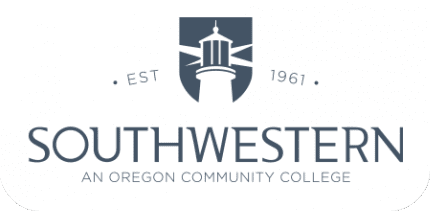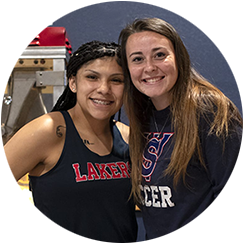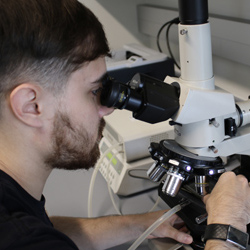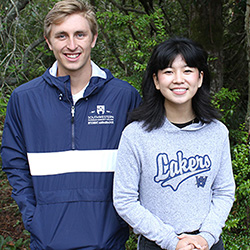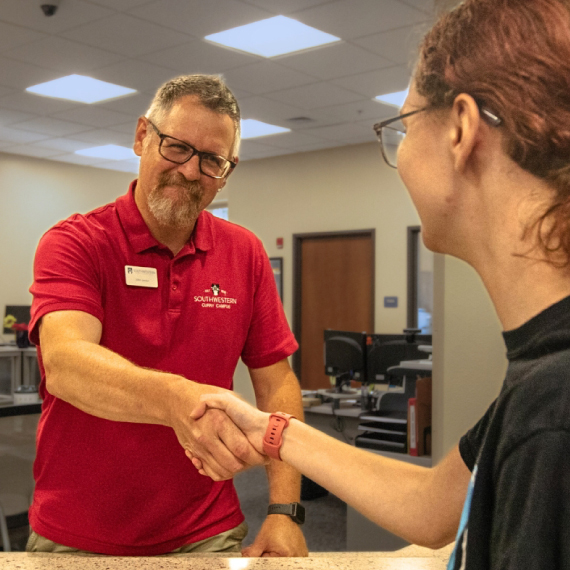
Aug 29, 2024 | Foundation, News, OCCI News, Student Success
Coos Bay, OR – The Southwestern Oregon Community College Foundation is proud to congratulate the 2024-25 scholarship recipients. Thanks to generous donors, the organization awarded nearly 200 scholarships totaling more than $300,000 for students attending Southwestern for the upcoming academic year.
“Students who receive scholarships tell us that it helps them get started on a goal they thought they couldn’t achieve,” said Karen Pringle Cunningham, SWOCC Foundation Board of Trustees member. “It boosts self-confidence and relieves a financial burden for them and their families. Seeing a thank you letter from a student you helped is a rewarding experience.”
Guided by a board of community volunteers, the Southwestern Foundation organized as a nonprofit organization in 1962, the year after the college started. Since then, thousands of students have attended the college and received Foundation scholarships. These awards help students by breaking down financial barriers and inspiring students to better their lives and futures.
If you are interested in donating to scholarships or volunteering with the Southwestern Foundation visit www.socc.edu/give or call 541-888-7209 for additional information.
2024-25 Southwestern Oregon Community College Foundation Scholarship Recipients
| SCHOLARSHIP |
RECIPIENT(S) |
| Andy Toribio Scholarship |
Sonia |
Haro |
| Ann Lansing Scholarship |
Steven |
Scruggs |
| Alicia |
Ames |
| Art and Toni Poole Scholarship |
Jessi |
Knudsen |
| Rylee |
Madison |
| Angel |
Garcia |
| Samuel |
LaGore |
| Isabelle |
Enright |
| Lily |
Gagnier |
| Brayden |
Lester |
| Kirra |
Cooley |
| Barbara Dodrill Scholarship |
Rebecca |
Healy |
| Barbara Emily Knudson Scholarship |
Emily |
Peck |
| Barbara Reynolds Scholarship |
Gio |
Castro |
| Baughman Memorial Apprenticeship Scholarship |
Dylan |
Kamph |
| Bay Area Picklers Scholarship |
Akshat |
Akshat |
| Bay Area Sportsman’s Association (BASA) Scholarship |
Kacee |
Ligons |
| Bechtold-Laird Health Care Scholarship |
Taryn |
Hurley |
| Ryan |
Cook |
| Bezzerides Scholarship |
Kylie |
Shaw-Kamehaiku |
| Dani |
Marshall |
| Cherie J. Mitchell Scholarship |
Jade |
Bernhardt |
| Cherish Pride Scholarship |
Lindsey |
Tatakis |
| Christine Moffitt Science Scholarship |
Jaclyn |
Young |
| Gracie |
Peach |
| Cole |
Roberts |
| Gabbard |
Herring |
| Heidi |
Graves |
| Chuck Hanners Scholarship |
Taylor |
Weidemiller |
| Clyde and Jackie Cherry Memorial Scholarship |
Nicole |
Hamby-Freund |
| Natasha |
Holmes |
| Coastal Clay Pottery Guild Scholarship |
Tori |
Goodell |
| Coos Bay Surfrider Scholarship |
Jaydenn |
Gamboa |
| Coos Bay Vision Center Scholarship |
Michelle |
McKiddy |
| Coos Bay-North Bend Rotary Scholarship |
Vanessa |
Cardoso |
| Coos County Realtors Scholarship |
Ning |
Zhao |
| Coquille Indian Tribe Scholarship |
Katie |
Gauntz |
| CTE Training Scholarship |
Quinn |
Komok |
| Curry Campus General Scholarship |
Brooke |
Gray |
| Gracie |
Brozdounoff |
| Alannah |
Clark |
| Dean and Jane Muffett Memorial Scholarship |
Kyla |
Bailey-Wilson |
| DeArmond CTE Scholarship |
AbbieGail |
Michael |
| Autum |
Burford |
| James |
Loetzerich |
| Auguste |
Ledji |
| Brittany |
Mueller |
| Dennis and Janet Beetham Family Scholarship |
Khobi |
Carmichel |
| Sam |
Hayes |
| Breck |
Jones |
| Samaan |
Abdul Aziz |
| Aubrey |
Brooks |
| Lars |
Knudsen |
| Cainan |
Stewart |
| Haydenn |
Matzner |
| Cameron |
Miller |
| Luke |
Norris |
| Stuart |
Kayanja |
| Tate |
Vigna |
| Donald Ivy Memorial Scholarship |
Mariah |
Hill |
| Dorothy Heagy Education Scholarship |
Aeryn |
Jones |
| Early Bird Scholarship |
Takemasa |
Okawa |
| Ernest L. Frye-Keizer Memorial Scholarship |
Katie |
Berger |
| Estella Morgan Memorial |
Michelle |
McKiddy |
| Flaxel Family Scholarship |
Holly |
Ullha-Reams |
| *Anonymous |
|
| Floyd Ingram Scholarship |
Marisol |
Carreno Yanez |
| Jackson |
Brazil |
| Lupita |
Trujillo |
| Godfred |
Amonoo |
| Forty & Eight Bobby L. Fraser Memorial Nursing Scholarship |
Jessica |
Jones |
| Hales Family Scholarship |
Nolan |
Black |
| Karli |
Daugherty |
| Jacob |
Montenero |
| Henry F. and Elva H. Hansen Memorial Scholarship |
Samantha |
Ward |
| ILWU Local 12 Scholarship |
Kaitlyn |
Dubisar |
| Jack & Margaret S. Dean Scholarship |
Alexa |
Crum |
| James Montalbano Scholarship |
Shyla |
Jorgensen |
| Adrean |
McGuire |
| Jessica |
Jones |
| Kiefer |
Allen |
| James Reed VanDuzer IV Scholarship |
Diego |
London |
| Jody McCaffree Social & Environmental Justice Scholarship |
Michelle |
Riley |
| John C. Anderson Memorial Scholarship |
Kaela |
Hickox |
| Aryanna |
Corrales |
| John W. Burles Memorial Scholarship |
Jasmin |
Mitchell |
| Abby |
Jessen |
| Taylor |
Weidemiller |
| *Anonymous |
|
| Keiser Scholarship for Culinary Excellence |
Brooklyn |
Hansen |
| Oliver |
Cowan |
| Stefania |
Tlachi |
| Kyle Trust Scholarship |
Holden |
Guzman |
| Laker Legacy Alumni Scholarship |
Hannah |
Tanner |
| Leonard C. Farr Community Service Scholarship |
Brooklyn |
Hansen |
| Linda Bufton Culinary Scholarship |
Monica |
Florez |
| Linda Kallgren Donaldson Nursing Scholarship |
Shantaya |
Cotton |
| Lisa G. Wampole Memorial Scholarship in Criminal Justice |
Shyla |
Applegate |
| Lyon/Orr Family Scholarship |
Lilly |
Dubisar |
| Martin Luther King Jr. Scholarship |
Isaiah |
Wilson |
| Mary, Kate and Cap Sharples Scholarship |
Makenzie |
Alexander |
| Maxine Smith Scholarship |
Stephanie |
Horn |
| May Virginia Smith VanDuzer Scholarship |
Sayana |
Phillips |
| Maybelle M. Olson Scholarship |
Hayley |
Brophy |
| Menasha Legacy Fund Scholarship |
Aimie |
Bussmann |
| Menasha Legacy Fund Scholarship |
Hope |
Schrag |
| Stephen |
Votaw |
| Asher |
Vredenburg |
| Brenna |
Watkins |
| Keagan |
Morris |
| *Anonymous |
|
| Mike Groben Scholarship |
Dezi |
Hazzard |
| Vincent |
Monaco |
| Military Families Scholarship |
Annalisa |
Norland |
| N/A Tuition Certificate donated |
Kaleb |
Clason |
| Nancy Douglas Memorial Scholarship |
Ava |
Bolster |
| New Beginnings for Tribal Students Scholarship |
Oliver |
Merritt |
| Ray |
Slocomb |
| Kota |
Bear |
| Kacee |
Ligons |
| Brooke |
Williams |
| Pacific Orchid Society Scholarship |
Irelyn |
Gibbs |
| Patricia Benetti Memorial Scholarship |
Rami |
Escure |
| Tia |
DeLorto |
| Patricia D. and William B. Smullin Scholarship |
Gracie |
Andrews |
| Garrett |
Bushnell |
| Paul Cameron Rients Memorial Scholarship |
Dominic |
Duckett |
| Presbyterian Church of Coos Bay Memorial Scholarship |
Ashlea |
Gottschalk |
| Carly |
Nair |
| *Anonymous |
|
| Randy Carpenter Memorial Scholarship |
Charles |
Woodruff |
| Bobbi |
Rangel |
| Roderick H. Morris Scholarship |
Brenden |
Kirby |
| Sandra Martinez & Carrie Kralicek Selfless Act Nursing Scholarship |
Shyla |
Jorgensen |
| Sharon Barnett Scholarship |
Trillian |
Zotti |
| Sharon Kolkhorst Memorial Nursing Scholarship |
Ruby |
Cardoso |
| Sheryl Rosenbaum Memorial Scholarship |
Taarna |
Lancaster |
| Shirley Barton Nursing Scholarship |
Ashley |
Watkins |
| Sickels Family Rural College Technology Scholarship |
Taylor |
Sheppard |
| Takeru |
Onozaki |
| Slaney Family Human Services Scholarship |
Alexis |
Rogers |
| Slaney Family Scholarship |
Emma |
Spalding |
| Stephens Family Scholarship |
Savannah |
Doughty |
| Annalisa |
Norland |
| Steve Shirtcliff CASA Scholarship |
*Anonymous |
|
| Student of the Year Scholarship |
Mark |
Gutierrez |
| SWOCC Foundation Board General Scholarship |
Chanel |
Greenwood |
| Shyla |
Applegate |
| Dustin |
Ledford |
| Taya |
Torres |
| Denese |
Abeyta |
| Morgan |
Herring |
| Rachel |
Jones |
| RayAnne |
Lockett |
| June |
Markum |
| SWOCC Foundation Culinary General Scholarship |
Zoe |
Andresen |
| Ashley |
Lavender |
| Olivia |
Fatooh |
| Mckenzie |
Palacios |
| Oliver |
Cowan |
| Stefania |
Tlachi |
| Fyn |
Elton |
| Sergio |
Rodriguez |
| Nathan |
Vance |
| Jasper |
Andersen |
| SWOCC Foundation General Nursing Scholarship |
Jessica |
Edmundson |
| Amanda |
Higgins |
| SWOCC Foundation General Scholarship |
Jeffrey |
Jennings |
| Wren |
Brown |
| Penelope |
Town |
| Paolo |
Flores |
| Cory |
Ricketts |
| Milagros |
Perez Nanez |
| Sonia |
Haro |
| Heather |
Beaird |
| Michael |
Knutsen |
| *Anonymous |
|
| The Friends of the Curry Public Library James Boyle Memorial Scholarship |
Zachary |
Renfro |
| TymByr Culinary Scholarship |
Jesse |
Spinella |
| Jennifer |
Parker |
| Uncork your Potential Scholarship |
Lily |
Isom |
| Uncorking Opportunity! Bandon Dunes Golf Resort Scholarship |
Rune |
Van Den Bosch |
| Uncorking Opportunity! Culinary and the Arts Scholarship |
Vanessa |
Barragan |
| Uncorking Opportunity! Ken Chard Scholarship |
Alannah |
Gee |
| Uncorking Opportunity! Nursing Scholarship |
Zubeda |
Ingabire |
| Uncorking Opportunity! Roos and Roos Scholarship |
Marcela |
Mendoza |
| Uncorking Opportunity! The Mill Casino Hotel Scholarship |
Dominic |
Duckett |
| Uncorking Opportunity! Warehouse Coffee Cafe Farm and Sea Scholarship |
Dawson |
Howerton |
| Vernon Brecke Memorial Scholarship |
Jill |
Holbrook |
| Vernon C. and Jean G. Sorenson Scholarship |
Mary |
Wolfe |
| William and Virginia Erickson Scholarship |
Mycah |
Nichols |
| Avineet |
Devi |
| William Lansing Scholarship |
Christopher |
Beil |
| Nevaeh |
Dewitt |
| Woolridge Myrtle Point Scholarship |
Hayley |
Brophy |
| Yellow Cab Taxi Scholarship |
Emmett |
Hawthorne |
| *Note: Some scholarship recipients request their award(s) not be listed publicly. The Foundation respects their privacy by not including them on this list. |

Jun 5, 2024 | Alumni, News, Student Success
Southwestern Oregon Community College’s 2024 Commencement Ceremony will take place on Friday, June 14, 2024, at noon in Prosper Hall on the Coos Campus, 1988 Newmark Ave., Coos Bay.
WATCH A LIVE STREAM OF THE CELEBRATION ON SOUTHWESTERN’S YOUTUBE CHANNEL HERE.
Southwestern is proud of the 2024 graduates! This year the College is pleased to honor a total of 401 graduates, from 24 states and eight countries.
Degrees being awarded are:
- 163 Associate of Arts Oregon Transfer
- 96 Associate of Applied Science
- 48 Associate of General Studies
- 52 Associate of Science
- 100 Certificates of Completion (one year)
Southwestern also congratulates 15 local high school students who acquired their associate degrees at the same time they were completing their high school diplomas.
Guest attendance at the ceremony is by ticket only. The celebration can be viewed live via Southwestern’s YouTube channel.
Additional information for graduates and their families can be found on the Graduation web page.
Graduating Class of 2024
|
GH = Graduating with Honors, 3.75 GPA PK = Member Phi Theta Kappa V = Valedictorian, 4.00 GPA
|

Jun 4, 2024 | Alumni, News, Student Success
Coos Bay, OR – Southwestern Oregon Community College is pleased to announce Reilly Meehan is the 2024 Distinguished Alumnus. Meehan graduated in 2011 from Southwestern with an Associate of Applied Science degree in Culinary Arts.
The Distinguished Alumni award recognizes individuals who demonstrate significant contributions to their professions, communities, or academia.
“Being chosen as the 2024 SWOCC Distinguished Alumni is a high honor and I am beyond grateful for the opportunity to continue to represent SWOCC and OCCI for years to come,” Meehan said.
“I was given the opportunity to pursue a career that not only allows me creative expression but also freedom and a space for individuality – all thanks to the nurturing nature of the staff and teachers I crossed paths with during my time as a student here. I look forward to seeing what this year’s graduates have to bring to this world and will continue to push myself to be the best role model I can for future graduates from this amazing program.”
The world first noticed Chef Reilly Meehan as an award winner. He won Best Young Chef in the World 2011 at the Chaines Des Rotisseurs Jenunes Comms competition in Istanbul, Turkey. That year at age 21, he was the first American to win the award – and the youngest award winner. He followed it up with awards in 2019 and 2022 – ACF Chef of the Year and Americas Global Chef Challenge champion.
Chef Meehan also is a natural teacher. An online mentor, he inspires people who are into food and non-foodies to get into food. This TikTok influencer has 391,000 people following his culinary video posts. Nearly 200,000 people follow him on Instagram.
“Reilly encompasses the best of both worlds,” says Executive Chef Randy Torres. “You can tell he has classical training with Old World style, but with a very modern approach. Fresh ideas. Inspirational. And really, he is inspirational to all genres of people from grandmas to Master Chefs.”
Meehan grew up in Central California. He first connected with Chef Torres as a high schooler during a culinary institute competition in San Jose. He enrolled at the school to learn from Chef Torres, who put together a competition team. Meehan learned and excelled. First competition he won a gold medal.
Torres soon moved to Oregon Coast Culinary Institute. In 2010, he began building the Youth Competition Team for the 2012 Culinary Olympics. Wanting to be on Torres’ team, Meehan followed him to Coos Bay to finish his studies. In 2011, he graduated and worked his way to fame.
Chef Meehan has worked at The Ritz Carlton, San Francisco’s famed The Bohemian Club and owned a restaurant. Now, as a private chef, Meehan jets between Phoenix and Southampton, N.Y. During moments of down time, he inspires thousands of people worldwide as an iconic, charismatic social media culinary teacher.
“Why he’s gaining success in his social media endeavors is his approachability and his overall demeanor,” says Torres. “Reilly’s a welcoming person and you belong in whatever he’s doing. He’s a black tie and T-shirt all rolled into one. He’s a complete package. You can have a beer with him or a glass of champagne.”
It’s very rare to ever see that in a chef. That’s why Southwestern is pleased to celebrate Chef Reilly Meehan as 2024 Distinguished Alum, and especially this year on the 25th anniversary of the Oregon Coast Culinary Institute at Southwestern.

May 29, 2024 | Curry Campus, News, Student Success
Coos Bay, OR – Southwestern Oregon Community College announces the names of students who excelled winter term for the 2023-2024 academic school year. These students are being recognized with placement on the college’s Dean’s List (DL), Honor Roll (HR) and Academic Excellence (AE) list.
• Academic Excellence – students must receive a GPA of 4.0 in at least 12 credits
• Honor Roll – students must receive a GPA between 3.5 and 3.99 in at least 12 credits
• Dean’s List – students must receive a GPA between 3.0 and 3.49 in at least 12 credits

May 23, 2024 | Curry Campus, News, Student Success
Southwestern Oregon Community College’s 2024 Commencement Ceremony will take place on Friday, June 14, 2024, at noon in Prosper Hall on the Coos Campus, 1988 Newmark Ave., Coos Bay.
Southwestern is proud of the 2024 graduates! This year the College is pleased to honor a total of 402 graduates, from 24 states and eight countries.
Degrees being awarded are:
164 Associate of Arts Oregon Transfer
96 Associate of Applied Science
48 Associate of General Studies
52 Associate of Science
100 Certificates of Completion (one year)
Southwestern also congratulates 15 local high school students who acquired their associate degrees at the same time they were completing their high school diplomas.
Guest attendance at the ceremony is by ticket only. The celebration can be viewed live via the College’s YouTube channel at https://www.youtube.com/@SouthwesternOR.
Additional information for graduates and their families can be found on the Graduation webpage located at https://www.socc.edu/graduation.
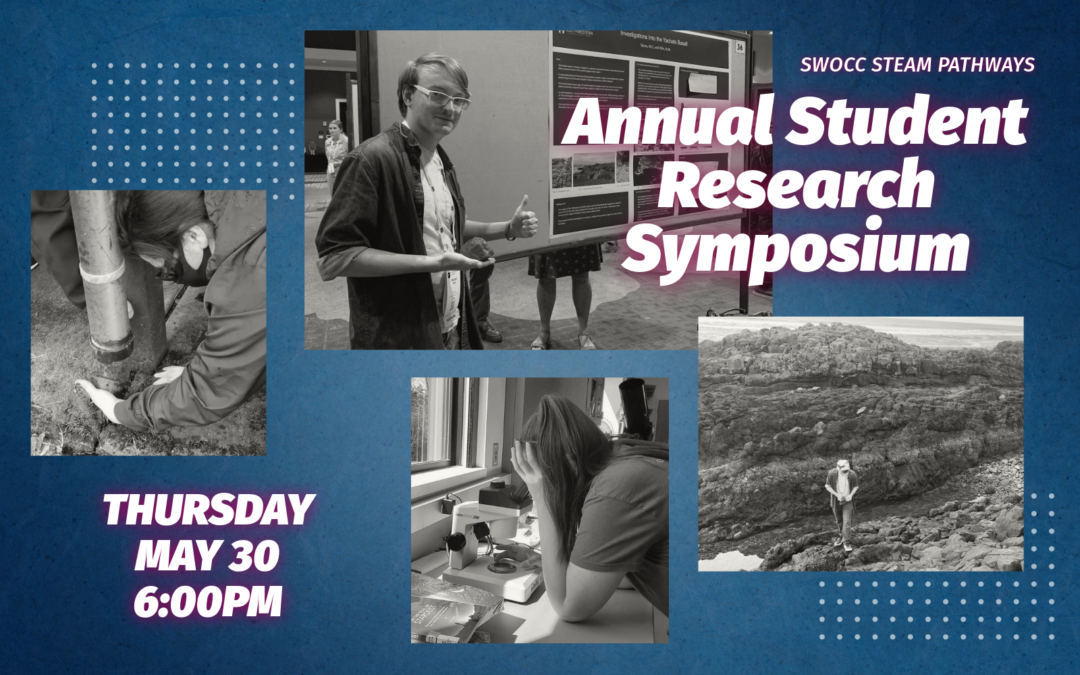
May 20, 2024 | Curry Campus, Curry News, News, Student Success
Southwestern Oregon Community College invites the community to join us on Thursday, May 30, 2024, at 6:00 pm, for our Annual Student Research Symposium. In addition to the student presentations, a poster exhibit will be on display starting at 5:30 pm in the Umpqua Hall Main Lobby. This is a free event; all ages are welcome.
Coos County residents can join us in-person in the Umpqua Hall lecture room 184 on the Coos Campus, 1988 Newmark Ave., Coos Bay.
Curry County residents can join us for a watch party in the Community Room on the Curry Campus, 96082 Lone Ranch Parkway, Brookings.
For those not able to attend in person the lecture will be streamed live on the College’s YouTube channel at: www.youtube.com/@southwesternOR/streams.
Southwestern’s student SPEAR (STEAM, Pathways, Experimental, & Academic Research) Team is actively working on a variety of science research projects. Participation on the team teaches students valuable skills and allows them to gain hands-on experience.
Students within Physics, Engineering, Geology, Computer Science, Biology, Agroecology, and Sociology will be showcasing their work for the community. Our SPEAR team is led by Krystal Hopper Meyers and mentored by Professors Aaron Coyner, Win McLaughlin, and Derek Morrelli.
Some of the projects include:
- attempting to increase flight time for an electrical aircraft using magnetic induction,
- recent developments in nuclear propulsion,
- searching for micrometeorites within local storm drains and investigating if they were significant in supporting early plant life,
- researching the fossils, chronology, and relationship to Cascadia megathrust earthquakes at Fossil Point,
- comparing the composition and extent of the Oregon Coast basalt and if it correlates with Yellowstone hotspot or not,
- interplanetary ion population modeling working with a Lead Scientist at Southwest Research Institute in San Antonio,
- locating never found before asteroids using data sent to us from the Panoramic Survey Telescope and Rapid Response System (PAN-STARRS) located at the Haleakala Observatory in Hawaii,
- statistical analysis of King Tide heights and frequencies working NOAA tidal data.
Many of these projects are supported by grants awarded through Oregon NASA Space Grant Consortium.
Additionally, Professors Jason Bennett and Maria Farinacci have two students who will be presenting research on invasive Green Crabs. These students recently finished an internship with South Slough National Estuary Research Reserve Lead Scientist, Dr. Shon Schooler. Posters from Professor Dana Pertermann’s Sociology students’ will also be on display. Topics from their research include Indigenous culture and raising grandchildren, Japanese marriage customs and culture, the study of forensics in time over the last 100 years, and changes in the human diet.
Please join us and help support these students while learning more about the exciting things happening at the College within our STEAM programs!
For more information contact Krystal Hopper Meyers, STEAM Pathways Assistant, at 541-888-7416, or krystal.hopper@socc.edu.
To learn more about STEM degrees at Southwestern visit: https://www.socc.edu/programs-classes/stem.

